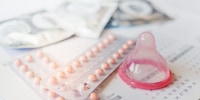
Background information
We asked a gynaecologist about natural birth control
by Natalie Hemengül

The vagina is a microcosm in itself, in which there is much to discover. But until now it has hardly been scientifically researched - to the detriment of vaginal health. Three researchers want to change that.
"A happy vagina at reproductive age should be about as acidic as tomato juice. And a single vaginal swab can contain as many bacteria as one-tenth of our brain has neurons." As hilarious as these facts may sound, there's a lot we don't yet know about this sex organ, because not a whole lot has happened (yet) when it comes to research on vaginal health. That's why three female scientists have launched "The Marie Project." Together, they want to counteract the stigmatization of vaginal health in our society as part of this research project. I met Dr. Sonja Merten virtually for a conversation. She is also the source of the quote above. She heads the Society, Gender and Health Unit at the Swiss Tropical and Public Health Institute (Swiss TPH) in Basel and oversees the Marie Project.
Sonja, you and your team are working on the microcosm of the vagina. Is it as small as it sounds?
Dr. Sonja Merten: Our body is home to a whole host of bacteria with which we live together. Most of them are located in the intestine. In the vagina we find the second largest collection. This is called the microbiome. It consists of a diversity of microbes. Unfortunately, we still know next to nothing about it.
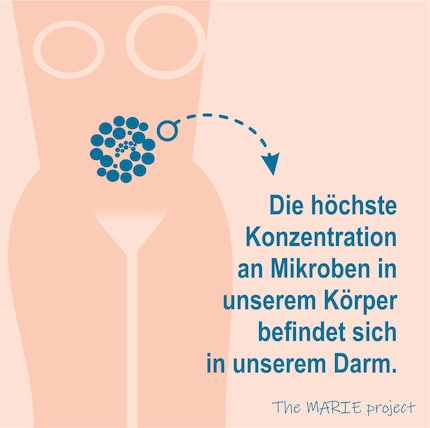
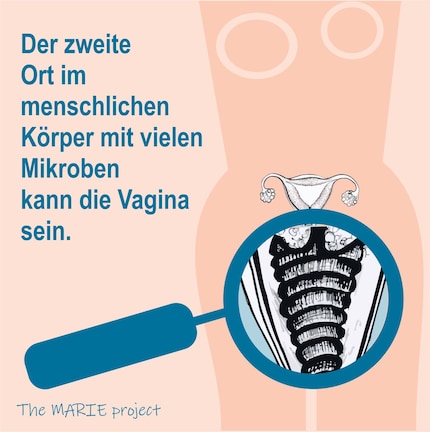
How should I imagine the vaginal microbiome?
The vaginal microbiome can best be described as a community of many different microorganisms such as bacteria. I also like to compare it to the soil in my garden. The organisms and various processes in it sometimes make my plants thrive better, sometimes less well. Applied to the vagina, this means that depending on which bacteria are present in it and in what composition, this has an influence on my health.
How does my microbiome influence my health?
Our mucous membranes are the gateway to the inside of the body. Here, the microbiome plays an important guardian role. It ensures that harmful germs, bacteria and protozoa do not enter our body. If your microbiome is healthy and intact, it protects you from unwanted guests, so to speak.
And what would those be?
For example, sexually transmitted diseases and infections such as vaginal fungus.
So what's upsetting my microbiome?
Different bacteria grow differently in different environments. Depending on how acidic or alkaline the environment is. The pH determines how good a breeding ground a bacterium has. If the culture medium changes, this affects the ratio of good to bad bacteria. The environment in the vagina is acidic by nature. The use of soap and shower gels disturbs this acidic pH, causing the proportion of acid-producing bacteria to shrink. This weakens the microbiome's guardian function and allows fungi to grow more easily. But there are many more practices and home remedies that we don't know if they are commonly used and to what extent they positively or negatively affect the composition of vaginal bacteria.
Something like tampons soaked in yogurt for fungal infections?
Exactly, such home remedies have hardly been researched. We still know too little about how women deal with vaginal problems: What do women do about bothersome discharge? Or when the vagina itches? We have no problem talking about the fact that we've had a cold for three days, so why does our need to communicate stop when it comes to vaginal discharge?
So we don't communicate enough?
Many are still reluctant to talk about such things and prefer to try anything before seeking professional help. I have already experienced how a young teenage girl came to me in tears and with pain in the vaginal area only after three weeks of perseverance. Simply because she didn't want to talk about it. I think that's terrible, it shouldn't be that way. We should be able to address vaginal discomfort. To do that, we need to know what it takes to de-taboo it.
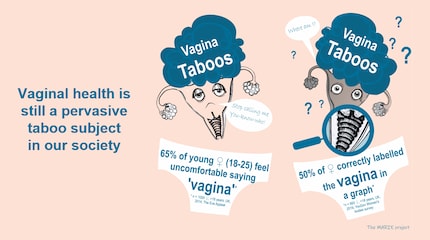
Back to the microbiome: does it look different in every vagina?
Which bacteria are present and in what proportions varies from vagina to vagina. We know, for example, that the microbiome of people who have cervical cancer is composed differently than that of a healthy person. The question is, which came first: the cancer or the different microbiome? There is also evidence that a healthy microbiome can protect us from miscarriage and have an impact on fertility. In addition, differences have been found between different ethnic groups. However, these are probably due to cultural things like diet and hygiene practices rather than genetics. But we don't know that for sure.
So more research in this area would help us?
Right. It would allow us to identify correlations to prevent potential problems and develop new therapies for different conditions.
**I read on your website that in the last 70 years, only three percent of research publications on the human microbiome have dealt with the vaginal microbiome. **
Vaginal health remains a taboo, niche area. As a result, it is difficult to obtain research funding for it. Why this is so is difficult to say. However, it is not new that too little research is done in gender-specific medicine and that important aspects are repeatedly neglected. The health of older women in particular has not been a focus of interest for a long time.
What has changed?
Today, older women have more purchasing power, which gives them more options for maintaining their own health into old age. Unfortunately, many vaginal complaints only occur postmenopausally. In the past, people thought: that's just part of getting older. Today we have a different attitude. This is creating a new interest and also a new market. But in terms of research, we are still at the very beginning.
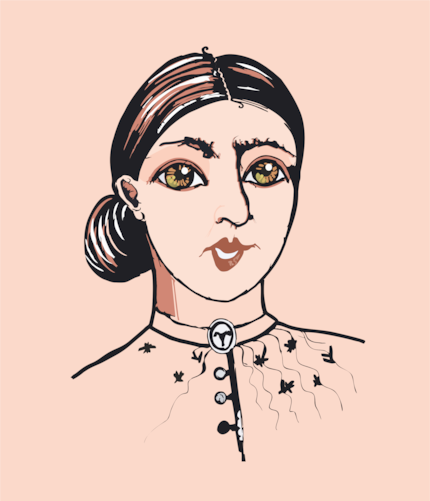
**"The Marie Project"**is a research project in which you are participating together with two other researchers. What would you like to find out?
The initiators of the basic research project are two young women: Monica Ticlla Ccenhua and Ethel Mendocilla Sato. The two scientists approached me with the idea of setting up a basic research project on the Swiss microbiome as a so-called citizens' science project. In other words, with the help and interest of lay people. We would like to develop our questions together with the participants and involve them in order to find out: What are people with vaginas interested in anyway? What needs do they have? From this, we can then deduce what research is relevant in the first place and what kind of research the participants would be willing to support.
The project is divided into three phases. What do these look like in concrete terms?
As a first step, we would like to recruit women to learn more about their attitudes toward vaginal health. So, based on this information, in a second step we could start a larger survey among women to get more representative data. In the third phase, we would like to ask women if they would like to know their microbiome and its composition, and if they would make the results available for research, and if so, for what kind of research.
Quite a bit of say ...
Participants rarely get to decide what happens to their own samples in research projects. We would like to change that. Participants should be able to retain as much control as possible over their biological samples. This way, they can be sure that they won't suddenly be involved in commercial research, even though they don't want to be.
You named the project after the Swiss physician Marie Heim-Vögtlin. Why?
The project is by women for women and people with vaginas. Marie Heim-Vögtlin was the first female doctor in Switzerland. She was also one of the founders of the first women's hospital here. We dedicate the project to her.
Do you also care about vaginal health? Here you can support the Marie project financially.

As a massive Disney fan, I see the world through rose-tinted glasses. I worship series from the 90s and consider mermaids a religion. When I’m not dancing in glitter rain, I’m either hanging out at pyjama parties or sitting at my make-up table. P.S. I love you, bacon, garlic and onions.
Interesting facts about products, behind-the-scenes looks at manufacturers and deep-dives on interesting people.
Show all